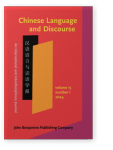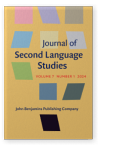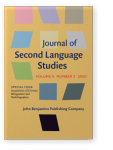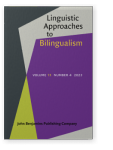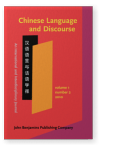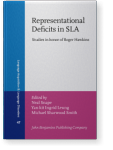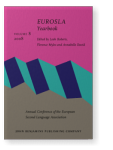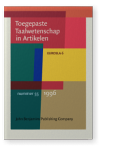Boping Yuan
List of John Benjamins publications for which Boping Yuan plays a role.
Journals
ISSN 2542-3835 | E-ISSN 2542-3843
Title
Acquisition of Chinese: Bilingualism and Multilingualism
Edited by Boping Yuan and Yanyu Guo
Special issue of Journal of Second Language Studies 3:2 (2020) v, 162 pp.
Subjects Applied linguistics | Language acquisition | Language policy | Language teaching | Multilingualism
2023 Asymmetric transfer and development of temporal-aspectual sentence-final particles in English-Cantonese bilinguals’ L 3 Mandarin grammars Linguistic Approaches to Bilingualism 13:4, pp. 576–606 | Article
Aiming to shed new light on the discussion on transfer at initial stages of third language (L3) acquisition and development at later stages, this article reports on an empirical study of L3 acquisition of Mandarin temporal-aspectual sentence-final particles (SFPs) le, ne and láizhe by English… read more
2023 What looks native-like may not necessarily be native-like: Evidence from L2 Chinese covert objects Linguistic Approaches to Bilingualism: Online-First Articles | Article
A substantial body of research has investigated null arguments in L2 Chinese, showing that they can be native-like. However, recent linguistic research has demonstrated convincingly that some ‘missing’ arguments in Chinese should be viewed not as ‘null’ arguments but as a result of movement and… read more
2020 Facilitative transfer only? L3 acquisition of Mandarin sentence-final particle clusters by English-Cantonese bilinguals Acquisition of Chinese: Bilingualism and Multilingualism, Yuan, Boping and Yanyu Guo (eds.), pp. 261–289 | Article
This study investigates transfer effects and later development in English-Cantonese bilinguals’ L3 Mandarin grammar. Three types of Mandarin sentence-final particle clusters are involved as the target structures. The results show that L3 learners with the knowledge of Cantonese behave in a less… read more
2020 Roles of positive and indirect negative evidence in L2 feature reassembly: An empirical study of L2 acquisition of Chinese and Thai collective markers Acquisition of Chinese: Bilingualism and Multilingualism, Yuan, Boping and Yanyu Guo (eds.), pp. 205–232 | Article
This article reports an empirical study investigating L2 acquisition of the Mandarin Chinese collective marker -men by adult Thai-speaking learners and the Thai collective marker phûak- by adult Chinese-speaking learners within the framework of the Feature Reassembly Hypothesis (Lardiere,… read more
2020 Definiteness constraint on subjects in L2 and L3 Mandarin grammars: Empirical evidence concerning the source of transfer in L3 acquisition Acquisition of Chinese: Bilingualism and Multilingualism, Yuan, Boping and Yanyu Guo (eds.), pp. 233–260 | Article
Recent research on third language acquisition has been focusing on identifying the source of transfer in third language (L3) acquisition. In this article, we report on an empirical study of a less-studied language combination of Mandarin, Cantonese and English, which examines how speakers of… read more
2010 Is the core-peripheral distinction for unaccusative verbs cross-linguistically consistent? Empirical evidence from Mandarin Chinese Language and Discourse 1:2, pp. 220–263 | Article
This paper presents the results of an empirical investigation into the characteristics of unaccusativity in Mandarin by building on the gradient approach to split intransitivity (Sorace, 2000) and previous analyses of Mandarin within that framework (Liu, 2007). The study explores the acceptability… read more
2009 Non-permanent representational deficit and apparent target-likeness in second language: Evidence from wh-words used as universal quantifiers in English and Japanese speakers' L2 Chinese Representational Deficits in SLA: Studies in honor of Roger Hawkins, Snape, Neal, Yan-kit Ingrid Leung and Michael Sharwood Smith (eds.), pp. 69–103 | Article
This paper reports on an empirical study examining L2 acquisition of Chinese wh-words used as universal quantifiers (UQs) by Japanese- and Englishspeaking learners. Results from a sentence acceptability judgment test and a sentence interpretation test indicate that wh-words can be acquired as UQs… read more
2008 'What is happened' in L2 English does not happen in L2 Chinese EUROSLA Yearbook: Volume 8 (2008), Roberts, Leah, Florence Myles and Annabelle David (eds.), pp. 164–190 | Article
In the literature, L2 learners of English are reported to have problems accepting grammatical unaccusative sentences like the cup broke yesterday although they accept the passivized form like the cup was broken yesterday (e.g. Yip 1995; Ju 2000). They also produce ungrammatical sentences like “If… read more
1996 How are Lexical-Semantic Differences Represented in L2 Syntax? A Study of the Unaccusative/Unergative Distinction in L2 Chinese EUROSLA 6: A selection of papers, pp. 201–215 | Article
It has been proposed that intransitive verbs can be divided into two subgroups, unaccusative verbs, such as break and arrive, and unergative verbs, such as laugh and swim. The former type has an internal argument, but no external one, whereas the latter type has an external argument but no internal… read more
